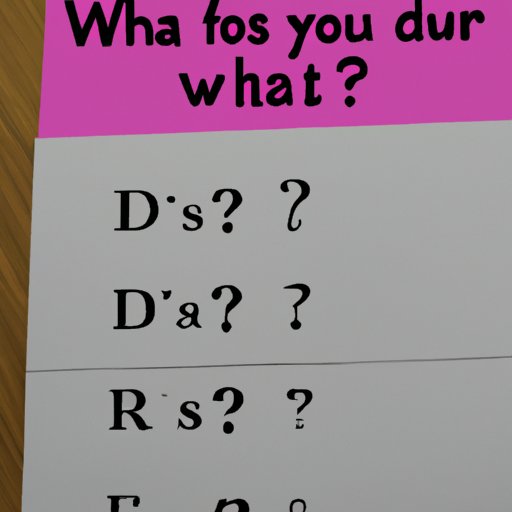Introduction
Science fairs are an important part of education. They give students the opportunity to explore their interests in science and technology, develop research skills, and present their findings in a creative way. But the first step to a successful science fair project is coming up with a great question.
Good science fair questions are ones that explore scientific principles, are testable, and have measurable results. They should also be interesting enough to capture the attention of the audience. In this article, we’ll explore what makes a good science fair question and provide some examples to get you started.
List of Interesting Science Fair Questions
Coming up with the perfect science fair question can be a challenge. To get your brain thinking, here are some ideas from different areas of science:
Ideas from Nature
- Does temperature affect the growth rate of plants?
- How do different types of soil affect plant growth?
- What type of light is best for photosynthesis?
- Does the color of light affect the behavior of insects?
- How does air pollution affect plant growth?
Ideas from Social and Behavioral Sciences
- What factors influence consumer buying behavior?
- How does music affect memory retention?
- What is the effect of violent video games on aggression?
- Does the presence of others affect decision-making?
- How does gender affect leadership styles?
Ideas from Technology and Engineering
- How does the angle of a ramp affect the speed of a rolling ball?
- What type of material is most effective for soundproofing?
- What is the optimal design for a wind turbine?
- How does the shape of an airplane wing affect its lift?
- Which type of motor is most efficient?
Other Ideas
- Does the amount of sugar in a drink affect its taste?
- Do the colors of packaging affect consumer preference?
- Does adding salt affect the boiling point of water?
- What type of insulation works best for keeping foods cold?
- Does color affect taste perception?
Creating the Perfect Science Fair Question
Once you have some ideas, it’s time to narrow down your choices and come up with the perfect science fair question. Here are some tips to help you along the way:
Choose a Topic of Interest
Start by choosing a topic that you find interesting. This will make it easier to stay motivated throughout the research process. Ask yourself what you want to learn more about and choose a topic that piques your curiosity.
Research Your Topic
Once you’ve chosen your topic, it’s time to start researching. Read books, articles, and other sources to gain a better understanding of the subject. As you’re researching, jot down any ideas or questions that come to mind.
Brainstorm Questions
Take the ideas and questions you’ve come up with and brainstorm ways to turn them into testable questions. For example, if you’re interested in studying how music affects memory, you could ask: “Does listening to classical music improve memory retention?”
Select the Best Question
Once you’ve generated several possible questions, it’s time to select the one that’s best suited for a science fair project. Consider the scope of the question, the amount of time it will take to complete the project, and the resources you have available.

How to Find Inspiration for Science Fair Questions
If you’re still having trouble coming up with the perfect science fair question, there are several ways to find inspiration. Here are some tips to help get your creative juices flowing:
Look at Sample Projects
One great way to find inspiration is to look at sample projects from previous science fairs. You can search online for topics that have been covered in past competitions. This can help you generate new ideas and see what kind of questions other students have asked.
Draw From Current Events
Another great way to find inspiration is to draw from current events. What’s happening in the world right now? Is there a new technology or scientific discovery that you can explore? Thinking about the latest news can help you come up with interesting questions.
Ask Open-Ended Questions
When brainstorming questions, it’s important to focus on open-ended questions rather than those with yes or no answers. Open-ended questions can lead to further exploration and deeper insights. For example, instead of asking “Does music help people remember things better?” you could ask “In what ways does music help people remember things better?”
Talk to Experts
If you’re having trouble coming up with questions, talking to experts in the field can be a great way to get ideas. Reach out to scientists, professors, and other professionals who can provide insight into your topic. They may have suggestions that can help you refine your question and make it more testable.
Use Online Resources
There are also many online resources that can help you come up with science fair questions. Websites like Science Buddies and Exploratorium offer helpful tools and advice. You can also search online for sample questions and ideas from past science fairs.

Tips for Choosing the Right Science Fair Question
Once you’ve come up with a few potential questions, it’s important to consider which one is best suited for a science fair project. Here are some tips to keep in mind when selecting a question:
Keep It Simple
The best science fair questions are simple and straightforward. Avoid questions that are too complex or require extensive research. Keep your question focused and make sure it can be answered within the timeframe of the project.
Make Sure It’s Testable
Your question should be something that can be tested and measured. Think about how you’ll collect data and analyze the results. Make sure the question has a clear answer that can be determined through experimentation.
Consider the Time Commitment
Before selecting a question, think about the time commitment required to complete the project. If the project will take more time than you have available, it’s best to choose a different question.
Aim for Originality
Finally, aim for originality. Try to come up with a question that hasn’t been studied before. This will help you stand out from other competitors and make your project more memorable.

Examples of Good Science Fair Questions
To help you get started, here are some examples of good science fair questions:
Does Adding Salt Affect the Boiling Point of Water?
How Do Different Types of Soil Affect Plant Growth?
How Does Music Affect Memory Retention?
What Type of Light is Best for Photosynthesis?
Does Color Affect Taste Perception?
Conclusion
Coming up with a good science fair question is the key to a successful project. It’s important to choose a topic that’s interesting and relevant, and to make sure the question is testable and measurable. With these tips and examples, you’ll be well on your way to creating a winning science fair project.
(Note: Is this article not meeting your expectations? Do you have knowledge or insights to share? Unlock new opportunities and expand your reach by joining our authors team. Click Registration to join us and share your expertise with our readers.)
